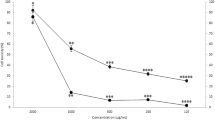Abstract
Anticancer effects of kimchi fermented for different times and containing added ingredients in HT-29 human colon carcinoma cells were studied. Optimally ripened kimchi showed higher anti-proliferation activities than fresh and over-ripened kimchi. Anticancer-ingredients-added kimchi exhibited higher activities than standardized-recipe kimchi in HT-29 cells. Optimally-ripened anticancer kimchi suppressed expression of Bcl-2 and promoted expression of Bax, caspase-9, and caspase-3 to promote apoptosis, and reduced mRNA expressions of proinflammatory factors, exhibiting the strongest anticancer effect. Fermentation and ingredients are important factors to increase in vitro anticancer functionalities.
Similar content being viewed by others
References
Park KY, Rhee SH. Functional foods from fermented vegetable products: kimchi (Korean fermented vegetables) and functionality. pp. 341–380. In: Asian Functional Foods. Shi J, Ho CT, Shahidi F (eds). CRC Press, Inc., Boca Raton, FL, USA (2005)
Park KY, Kim BK. Lactic acid bacteria in vegetable fermentations. p. 187. In: Lactic Acid Bacteria: Microbiological and Functional Aspects. Lahtinen S, Salminen S, Von Wright A, Ouwehand AC (eds). CRC Press, Inc., Boca Raton, FL, USA (2011)
Park KY, Jeong JK, Lee YE, Daily JW 3rd. Health benefits of kimchi (Korean fermented vegetables) as a probiotic food. J. Med. Food 17: 6–20 (2014)
Park KY, Cho EJ, Rhee SH. Increased antimutagenic and anticancer activities of Chinese cabbage kimchi by changing kinds and levels of sub-ingredient. J. Korean Soc. Food Sci. Nutr. 27: 625–632 (1998)
Choi SM, Kil JH, Jeon YS, Park KY. Fermentation characteristics, and antimutagenic and anticancer effects of mistletoe added kimchi. J. Korean Assoc. Cancer Prev. 8: 98–106 (2003)
Sun SY, Hail N Jr., Lotan R. Apoptosis as a novel target for cancer chemoprevention. J. Natl. Cancer I. 96: 662–672 (2004)
Zhang L, Xing D, Chen M. Bim(L) displacing Bcl-x(L) promotes Bax translocation during TNFα-induced apoptosis. Apoptosis 13: 950–958 (2008)
Gross A, McDonnell JM, Korsmeyer SJ. BCL-2 family members and the mitochondria in apoptosis. Gene. Dev. 13: 1899–1911 (1999)
Pandurangan AK, Esa NM. Dietary non-nutritive factors in targeting of regulatory molecules in colorectal cancer: An update. Asian Pac. J. Cancer Prev. 14: 5543–5552 (2013)
Poligone B, Baldwin AS. Positive and negative regulation of NFkappaB by COX-2: Roles of different prostaglandins. J. Biol. Chem. 276: 38658–38664 (2001)
Cho EJ, Lee SM, Rhee SH, Park KY. Studies on the standardization of Chinese cabbage kimchi. Korean J. Food Sci. Technol. 30: 324–332 (1998)
Kim BK, Park KY, Kim HY, Ahn SC, Cho EJ. Anti-aging effects and mechanisms of kimchi during fermentation under stress-induced premature senescence cellular system. Food Sci. Biotechnol. 20: 643–649 (2011)
Park KY, Cho EJ, Rhee SH, Jung KO, Yi SJ, Jhun BH. Kimchi and an active component, β-sitosterol, reduce oncogenic H-Rasv12-induced DNA synthesis. J. Med. Food 6: 151–156 (2003)
Adams JM, Cory S. The Bcl-2 protein family: Arbiters of cell survival. Science 281: 1322–1326 (1998)
Kong CS, Bahn YE, Kim BK, Lee KY, Park KY. Antiproliferative effect of chitosan-added kimchi in HT-29 human colon carcinoma cells. J. Med. Food 13: 6–12 (2010)
Watanabe K, Kawamori T, Nakatsugi S, Wakabayashi K. COX-2 and iNOS, good targets for chemoprevention of colon cancer. Biofactors 12: 129–133 (2000)
Author information
Authors and Affiliations
Corresponding author
Rights and permissions
About this article
Cite this article
Kim, B., Song, JL., Ju, JH. et al. Anticancer effects of kimchi fermented for different times and with added ingredients in human HT-29 colon cancer cells. Food Sci Biotechnol 24, 629–633 (2015). https://doi.org/10.1007/s10068-015-0082-3
Received:
Revised:
Accepted:
Published:
Issue Date:
DOI: https://doi.org/10.1007/s10068-015-0082-3




